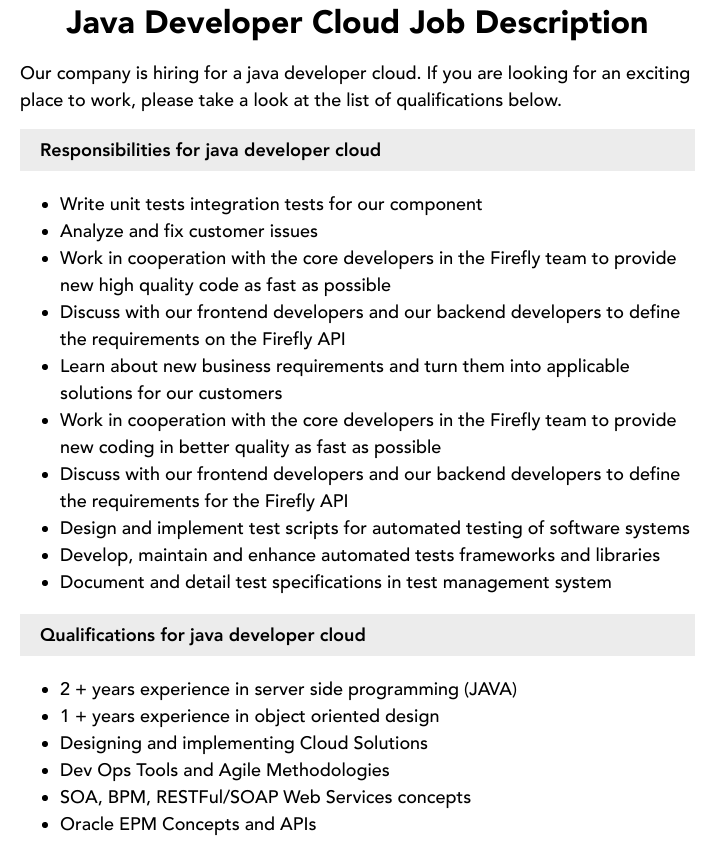What is the role of Java AWS developer?
What is the role of Java AWS developer?

As a Java AWS Developer, you play a crucial role in designing, building, testing, and maintaining cloud-based applications that run on Amazon Web Services (AWS). Your primary responsibility is to develop scalable, secure, and efficient software solutions that meet the requirements of various stakeholders.
Here are some key responsibilities:
Design and Development: You will design and develop Java-based applications for AWS, using programming languages such as Java, Scala, or Kotlin. You'll write clean, readable, and testable code, following best practices in software development. Cloud Architecture: As an AWS developer, you'll have a deep understanding of cloud computing concepts, including scalability, reliability, security, and performance. You'll design and implement cloud-agnostic architectures that can be easily deployed on AWS. Integration with AWS Services: You'll integrate your Java applications with various AWS services, such as Amazon S3, Amazon DynamoDB, Amazon Lambda, or Amazon API Gateway. This requires in-depth knowledge of each service's capabilities, limitations, and best practices for integration. Security and Compliance: As a responsible developer, you'll ensure that your applications meet the security and compliance requirements of AWS, including data encryption, access controls, and logging mechanisms. Testing and Deployment: You'll test your Java applications thoroughly to ensure they meet the required quality standards. Once tested, you'll deploy your applications on AWS using various deployment strategies, such as Blue/Green deployments or rolling updates. Monitoring and Maintenance: After deployment, you'll monitor your application's performance, latency, and error rates, making necessary adjustments to ensure optimal performance. You may also need to troubleshoot issues, resolve errors, and perform routine maintenance tasks. Collaboration with Teams: As an AWS developer, you'll work closely with cross-functional teams, including DevOps engineers, QA testers, product managers, and other stakeholders. You'll communicate technical requirements, provide status updates, and collaborate on project planning and execution.To be successful in this role, you should possess:
Strong Java programming skills In-depth knowledge of AWS services and their integrations Experience with cloud computing concepts and architecture Excellent problem-solving skills and attention to detail Ability to work independently and collaboratively as part of a team Strong understanding of software development life cycles, testing, and deployment strategies Familiarity with Agile development methodologies and version control systems (e.g., Git) Good communication and interpersonal skillsIn summary, as a Java AWS Developer, you'll be responsible for designing, building, testing, and maintaining cloud-based applications on Amazon Web Services. Your expertise in Java programming, cloud computing, and AWS services will enable you to develop scalable, secure, and efficient software solutions that meet the needs of various stakeholders.
Java AWS SDK v2

I'll respond in English for your request!

Java AWS SDK v2 is a powerful tool for interacting with Amazon Web Services (AWS) using the Java programming language. Released in 2020, it provides a more modern and efficient way of working with AWS compared to its predecessor, the AWS SDK for Java v1.
Key Features
Some of the key features that make Java AWS SDK v2 an excellent choice include:

Benefits
The benefits of using Java AWS SDK v2 are numerous:
Easier development: With its type-safe API and improved documentation, the new SDK makes it easier to develop and maintain AWS-based applications. Faster execution: The SDK's optimized code paths and lazy loading features can lead to significant performance improvements in your applications. Improved error handling: The new SDK includes enhanced error handling capabilities, making it easier to detect and recover from errors. Better security: Java AWS SDK v2 includes improved support for Amazon Cognito and other security features, helping you build more secure and trustworthy applications.Migrating from Java AWS SDK v1
When migrating your existing Java codebase to use Java AWS SDK v2, you may need to make some adjustments:
Upgrade dependencies: Ensure that you update your Maven or Gradle dependencies to reference the latest version of the SDK. Rename classes and methods: Some classes and methods have changed names in the new SDK, so be sure to update your code accordingly. Migrate configurations: Update any AWS configuration files or objects to match the new SDK's naming conventions.Conclusion
Java AWS SDK v2 offers significant advantages over its predecessor, including a type-safe API, immutability, lazy loading, streaming support, and async programming. By leveraging these features and benefits, you can build more efficient, scalable, and reliable AWS-based applications using Java.





























